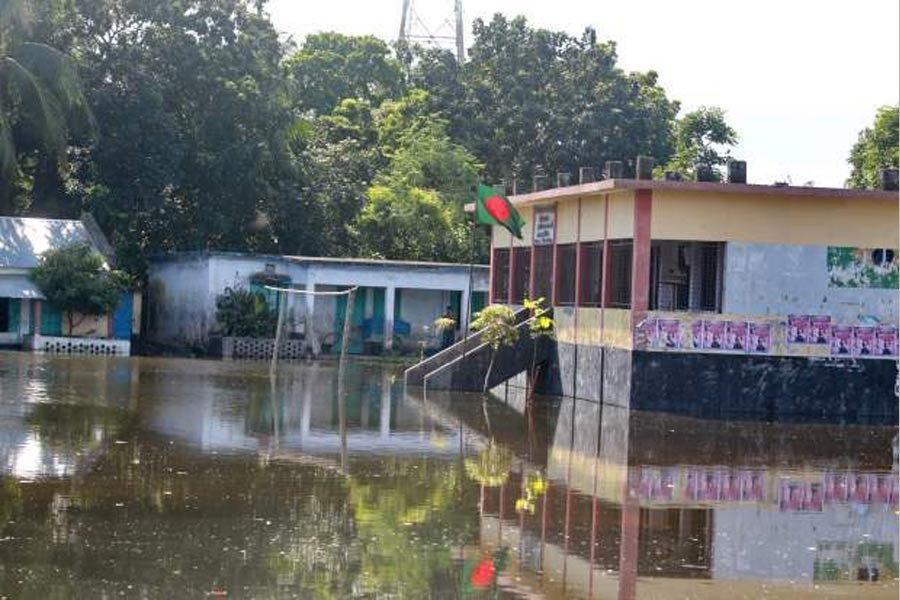Apart from homesteads, crop fields and different rural structures, there's another set-up which bears the brunt of prolonged floods. They are the rural schools. Both print and electronic media are seen broadcasting reports on flood- and river erosion-hit schools almost round the year. Unlike floods, erosions cause sudden damages to schools. In cases, many a damaged village school remains beyond the very notice of the education authorities --- let alone prompting them to come forward and help the schools go through repair works.
This year's flood, still in its early stage, has already begun seeing students attending classes filled with ankle- to knee-deep water. Weeks back, they used to come to school on foot, alone or in groups. Now they use boats or rafts. Before the start of the school hours, during short breaks or after the end of school, the school playground the other day served as an ideal venue of sporting activities. With flood water submerging the playground, the students have no fun to engage in except gossiping idly inside the classes. A situation like this normally doesn't have much impact on the school-based curricular activities. The problem begins when the school structure gets affected by the onslaught of a severe flood. In rural Bangladesh, such floods leave their scars on schools, especially those not brick-built. However, lots of concrete schools also collapse after standing in water for months.
Be they fully or partly government-run, or on the list of monthly payment order (MPO), all of the flood-hit schools have to go through the same fate. Given the flood-time and post-flood plight of these schools, the state of the privately-run schools, especially the primary ones, could be understood. Instances of many flood or storm-battered schools disappearing for good are plenty. Many also remain standing in a ramshackle state, with a handful of students attending them as part of a routine exercise. At one point, when it turns unbearable for them to attend classes due to scorching sun or rain-swept wind, they begin dropping out. It might take a few monitoring campaigns on the part of the zonal Education Engineering Departments to identify these natural disaster-stricken schools, as well as a few colleges.
The irony is the government annually keeps a considerably large chunk of the national budget with the objective of developing education. But the aim finally remains limited to the upgrading of qualitative or text-based education. In line with this, Bangladesh has made great strides in attaining its targeted goal of universal primary education. With the increase in the primary school enrolment, and the noticeably declining dropout rate, the country was able to meet one of the eight 2015 Millennium Development Goals (MDGs) declared by the UN for a 15-year period. Coming to the junior and secondary school levels in the rural area, the overall outlook seemed almost equally heartening. Yet all these achievements continue to pale in relation to infrastructural support, a basic requirement for improvement in pre-secondary education.
In a country ever vulnerable to floods and other natural calamities, school houses ought to be strongly built. Thanks to numerous administrative and latent drawbacks, rural education centres have hardly received the kind of focus that goes to their urban counterparts. To call this style of operating school education discriminatory is a digression. The problem lies with the very attitude of the city-based education authorities towards the overall rural education. That there are scores of exceptionally brilliant students in villages have been proved time and again. But dampers keep creeping in. The lacklustre educational attainment of village-based students has a lot to do with the insufficient facilities they have to make do with. They need qualified teachers. And also schools resistant to the onslaughts of floods, erosion and cyclones.
shihabskr@ymail.com


